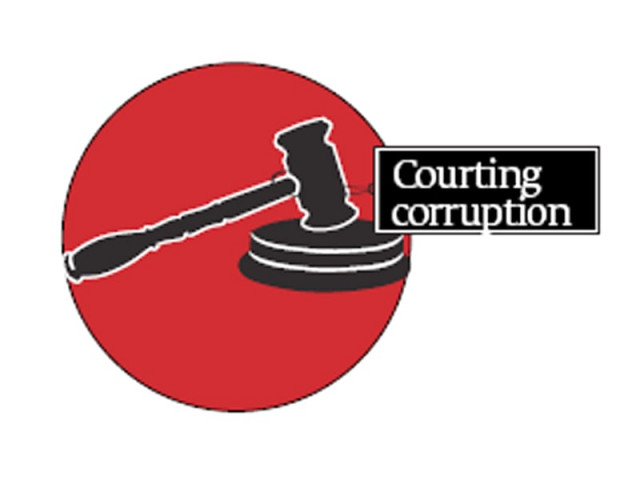Root and branch reforms needed
In concluding the series, we look at the need for effective anti-corruption rules.

Root and branch reforms needed
At the conference, delegates were open about the scale of the problem.
A district and sessions judge from Khyber-Pakhtunkhwa, Sardar Muhammad Irshad, said that “the lawyer community, especially, is quite actively involved in bribing the economically-deprived court employees in order to ensure the acquittal or determination of cases in their favour, since the staff at the lower level are easy prey for such temptations, owing to their fragile financial position.”
Corruption at the lower level is not the only issue. In 2001, under a programme called Access to Justice, judicial reforms were to be implemented in courts across the country with a loan of $350 million dollars secured by the Asian Development Bank through the ministry of law.
But with the change of government, in 2008, Farooq H Naek, the then law minister, initiated an audit inquiry over allegations that funds were misused. Sources who worked closely on this programme say most of the money was wasted on the construction of ‘beautiful’ court buildings.
Four months after the restoration of the judiciary in March 2009, the chief justice of Pakistan enforced a new judicial policy where he categorically stated that there will be zero tolerance for corruption. Three years later, the judiciary has been unable to curtail corruption, and the anti-corruption department has not done much either.
Ironically, the regional office for the anti-corruption department in Lahore is located right across from the lower courts of the city, where the director Aijaz Ahmed also acknowledges the existence of corruption.
“Not just in the court premises, but even near police stations, there are people who you can pay and get work done,” he casually says. “But we cannot take action unless there is a complainant,” he adds. The director states that the reluctance of people to come to them is because, in the eyes of the law, those who pay bribes, as well as those who receive money, are both guilty under the law.
“Without a law for whistleblower protection, the complainant ends up becoming a culprit too, and this needs to change,” says Adil Gilani, Pakistan’s adviser to Transparency International, a leading global watchdog for corruption.
Gilani asserts that the main cause of corruption in the lower courts is economic pressure, since the salaries of judges at the lower level have not been increased as much as at those in the higher courts.
“Corruption in the lower courts is like organised crime,” he says.
Published in The Express Tribune, February 3rd, 2012.



















COMMENTS
Comments are moderated and generally will be posted if they are on-topic and not abusive.
For more information, please see our Comments FAQ